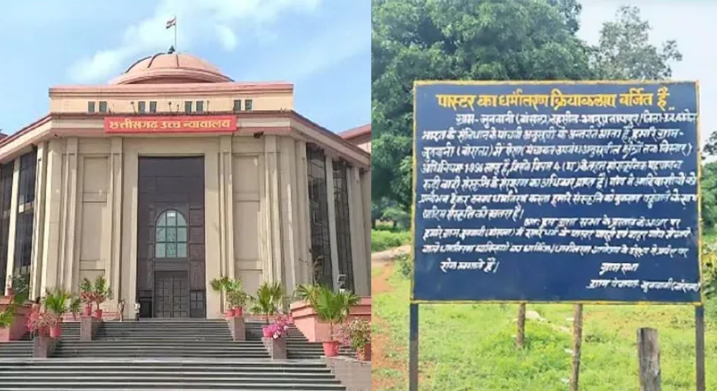Chhattisgarh court upholds anti-conversion signs in certain villages
The local High Court rejected a petition challenging signs banning Christian clergymen and converts from certain villages, ostensibly to defend the “local cultural heritage”. For the Syro-Malabar Church, this is the worst example of divisiveness since partition, marking out Christians “as second-class citizens”.
Raipur (AsiaNews) – The Chhattisgarh High Court has rejected two petitions seeking the removal of signs banning Christian clergymen and "Christian converts" in eight villages in the state, ruling that the signs were installed to prevent forced conversions through enticement or fraudulent means and therefore cannot be considered unconstitutional.
On 28 October, the High Court bench of Chief Justice Ramesh Sinha and Justice Bibhu Datta Guru said that the signs “appear to have been installed by the concerned Gram Sabhas as a precautionary measure to protect the interest of indigenous tribes and local cultural heritage.”
The Syro-Malabar Church has strongly condemned the signs, which describe forced conversions as a social evil, because they are “the most divisive boundary the country has seen since partition” and mark out a “group of people as second-class citizens”.
“In a nation where lynch mobs, killers, persecutors of Dalits and Adivasis, and those forcing ‘ghar wapsi’ conversions are not prohibited, this verdict must be challenged in the Supreme Court,” reads the statement issued by the Syro-Malabar Church today.
“In secular India, forces of Hindutva have successfully launched yet another experiment in religious discrimination and aggressive intolerance. By putting up these boards banning pastors and converted Christians in certain villages of Chhattisgarh, a new chariot march of institutionalised communalism has been set in motion.”
The anti-Hindutva resistance “must not be waged in alliance with any kind of religious fanaticism — it must be waged only in alliance with the Constitution of India, the Magna Carta of citizens’ rights,’’ the statement added.
15/12/2025 18:52
03/12/2020 15:12







.png)










